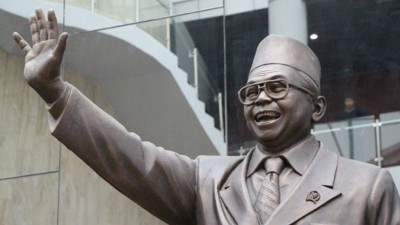The Process Of Democracy

By: K.H. Abdurrahman Wahid
REFORM IS NOT A PROCESS THAT WOULD END IN ONE OR TWO YEARS; It may even take one generation. While there is no attempt to disown mistakes, it is incorrect to say that the current government is not trying to move towards that end.
It is an unassailable fact that there have been fundamental changes. Freedom of the Press, the freeing of political prisoners and other major farreaching decisions are bur some that attest to that
The fact that the realities must be followed through by other decisions is inevitable. The problem is, to what extent can they be implemented?
Democratization is a process that must be made workable. As such, it must be realized that not all facets [of life] that need be democratized can be done all at the same time. We need staying power to do that.
The thought that democratization can be done rapidly is something chat VI Lenin consider as “infantile lefusm”, which is akin to committing suicide Democratization requires strength and can only be realized over a period of time
In Thailand, for example, many have demand adjustments in the future, complaining over the excessive power vested in the king and the military In citing this case I wish merely to illustrate that the process of democratization requires a lengthy period and a strong stamina.
In the face of that, I wish to refer to an adagium of the usuhul fiqh (the philosophy of Islamic laws) I came across the adagium when I was studying at a pesantren (Muslum boarding school) 43 years ago The adagium was expressed by Imam Syafi’l 12 centuries ago in his monumental work Al-Realah. The adagium was. “Do not abandon what constitutes to be the essence, if you cannot achieve the whole (Maa la yudroku kullubu, lam yuthrak jullubu)
I refer to this adagium in maintaining ties with the armed forces, a strategy that many dismiss as a mistake. However, had I not done that, the current TNI structure would not have lent support to democratization. And without their support, there is little we could do despite all the cacophony on reforms by people whose mindset is actually pro-status quo.
My insistence to distinguish between institution and the people in official positions within TNI carries an important meaning. This means we need to respect TNI as an institution while at the same time allow law enforcement to follow its course. This is a source of concern to people who use sovereignty of law as the measure of the success of the process of democratization. The sovereignty of law shall hold together with freedom of the Press, equal treatment before the laws and good governance.
As such, it should become clear to us all that the strategy [of deploying all our resources in an all-out manner] must be applied in a creative way. In a given situation we need to be defensive. in others we should hit and run.
That, in essence, is the upside and the downside of democratization, which has to go through a very long process. As the late Winston Churchill once said, “Democracy is a system of government rife with flaws, but it is still better than other systems of government.”